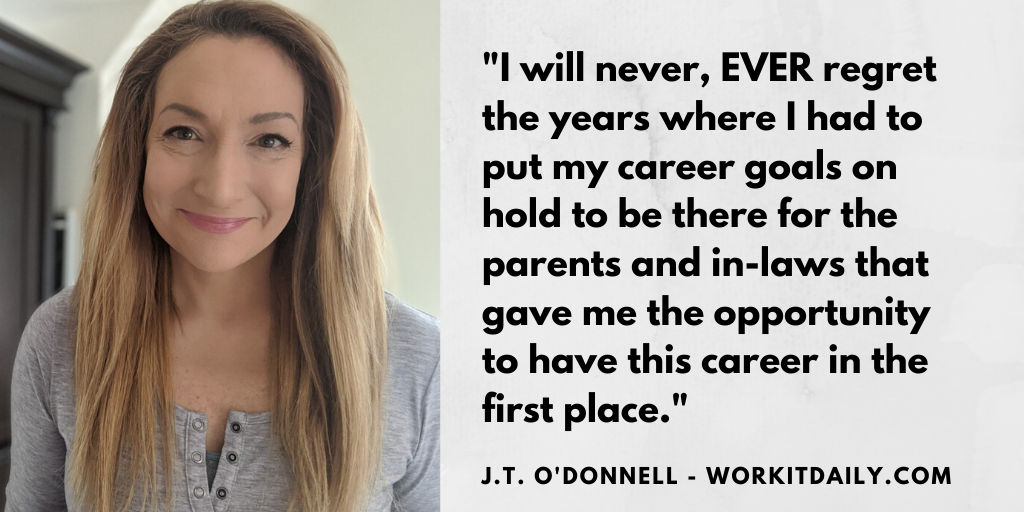Right around New Year’s, my roommate from college shared a post on Facebook expressing her pride for her husband who had just posted a very honest, emotional article on LinkedIn. Entitled, “My Greatest Professional Accomplishment… Demoting Myself.” In it, Tim Brown shares why he chose to step down from his high-powered leadership role to take an individual contributor role so he could be there for his ailing parents. I can relate deeply to Tim’s situation. I was in the same boat 3 years ago with my dad who eventually lost a hard battle with lung cancer.
I can honestly say, if I didn’t own my own company and have the most incredible teammates, I wouldn’t have gotten through it. Had I been in a job working for someone else, I am certain I would have quit the job and demoted myself too.
Then, same thing happened again last year when my in-laws, who my husband I cared for heavily over the last couple of years, passed within 3 weeks of each other. Once again, if I wasn’t my own boss, I highly doubt I would have been able to keep a job. Caring for sick parents in their final days is so physically and emotionally draining. And, it doesn’t end the day they die. In my experience, there’s a good six months after where you try to move on and get back to life.
And to make matters worse, in our performance-based work world, this well-intended time-out from career growth can actually hurt us.
Some people, like my friend’s husband, are able to demote themselves and keep working. Others have to quit entirely. Either way, when it comes time to gear the career back up and look for a new job, the facts on the resume works against them when applying online. ATS (Applicant Tossing Systems) are designed to rank and weed out people who don’t meet specific criteria. Seeing your job title go backwards, or even worse, seeing a gap in your work experience, will cost you the interview. The ATS can’t read between the lines. It just does what it’s told. Which is why professionals caring for sick parents need to do the following things to get their career back in growth mode.
Tip #1: Find a way to keep your toe in the water.
Tim took a demotion, but kept working. For those who have to quit entirely, find online classes or try to do some freelance or project work. Anything you can do to keep your knowledge and skills relevant. You need to show that while your priorities are temporarily shifting to care for your parents, you still love your career and want to find a way to keep it alive. To give you an idea, in HR circles, I’ve heard them say that for every year you are out of your job, you lose 10% of your skills and relevance. This is why so many parents who quit their jobs to stay home with kids for the first six years until they go back to work find out they essentially have to start over. With more than half their skills outdated in the minds of employers, they are seen as having entry-level skills.
Tip #2: Double down on serving your network.
Spend time each week reaching out and touching base with colleagues. See what they are working on and how you can help them. Make introductions within your network, offer them free advice and support. Post helpful industry content in your LinkedIn feed. Do what you can to let your network know that while you are busy caring for your parents, you still care for them. First, connecting with your peers will help you feel better. And second, they’ll remember your kindness and compassion. Especially, when it comes time to do tip #3…
Tip #3: Let the world know (loudly!) when you are ready to get back at it.
Tim’s blog post was brilliant. He let himself be vulnerable to his network. BUT, he also made it clear he’s ready to put his career back in growth mode. And the best part? When he eventually ends up in a leadership role again, imagine what kind of compassionate manager he will be? He’s just had a profound life experience that will make him even more effective. By sharing it online, he just proved his value. His network knows he is ready to go and has used what has happened to him to grow as a person. When you can close this chapter of your life with a commitment to use it to be a better professional, AND let your network know, you are on your way to future success.
One of the most valid reasons to put your career on hold is caring for the people who gave you life.
I will never, EVER regret the years where I had to put my career goals on hold to be there for the parents and in-laws that gave me the opportunity to have this career in the first place.
I know if you’re reading this, you feel the same way. And, when it’s over, because it does end, how you refocus on growing your career will determine how quickly you get back in the groove. Please make them proud by going after your dreams with purpose.
Today, I carry in my heart and mind the belief that my dad and in-laws are looking down on me with love and support. I had their backs, and truly believe, now they’ve got mine!
Originally published on LinkedIn.com
Follow us here and subscribe here for all the latest news on how you can keep Thriving.
Stay up to date or catch-up on all our podcasts with Arianna Huffington here.


